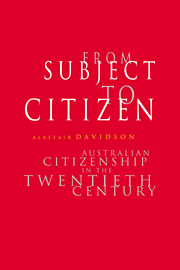Part III - The Active Citizen and Beyond
Published online by Cambridge University Press: 06 January 2010
Summary
This section looks at how far Australia has met the criteria for the ‘active’ citizen and, in particular, what its attitude has been towards ‘democracy’ in any of its forms. The record, past and present, is not good. If I may parody an ideological work in this area, Australian democracy was ‘still-born’.
The first formal legal statements of what it is to be a citizen in a modern state are found in the 1791 and 1793 French Constitutions. They make quite clear that the fundamental right of an ‘active’ citizen is the right to vote as an equal of every other citizen. Aristotle would have found such a formulation unexceptionable and it has remained the basic active right ever since.
The vote was what ensured that citizens lived under laws they made for themselves and were thus not only committed to the state which enforced them, but also free in a meaningful social sense. Through the vote the sovereignty of the people was guaranteed. In itself the vote was thus merely a procedural form designed to guarantee that state of affairs which Hans Kelsen has called ‘power from below’ rather than ‘from above’.
Democracy, understood as ‘power from below’, clearly denies the rule of experts. It also regards all citizens as equal through the vote regardless of their real attainments or status in non-political worlds. In turn, this only makes sense because the ‘equality’ refers not to any real skill of a practical or informational sort but to an equality in contributing to the joint agreement on what is the good for that polity. Aristotle's words were that all citizens in a democracy were equal in ‘passing judgment’.
- Type
- Chapter
- Information
- From Subject to CitizenAustralian Citizenship in the Twentieth Century, pp. 217 - 222Publisher: Cambridge University PressPrint publication year: 1997



